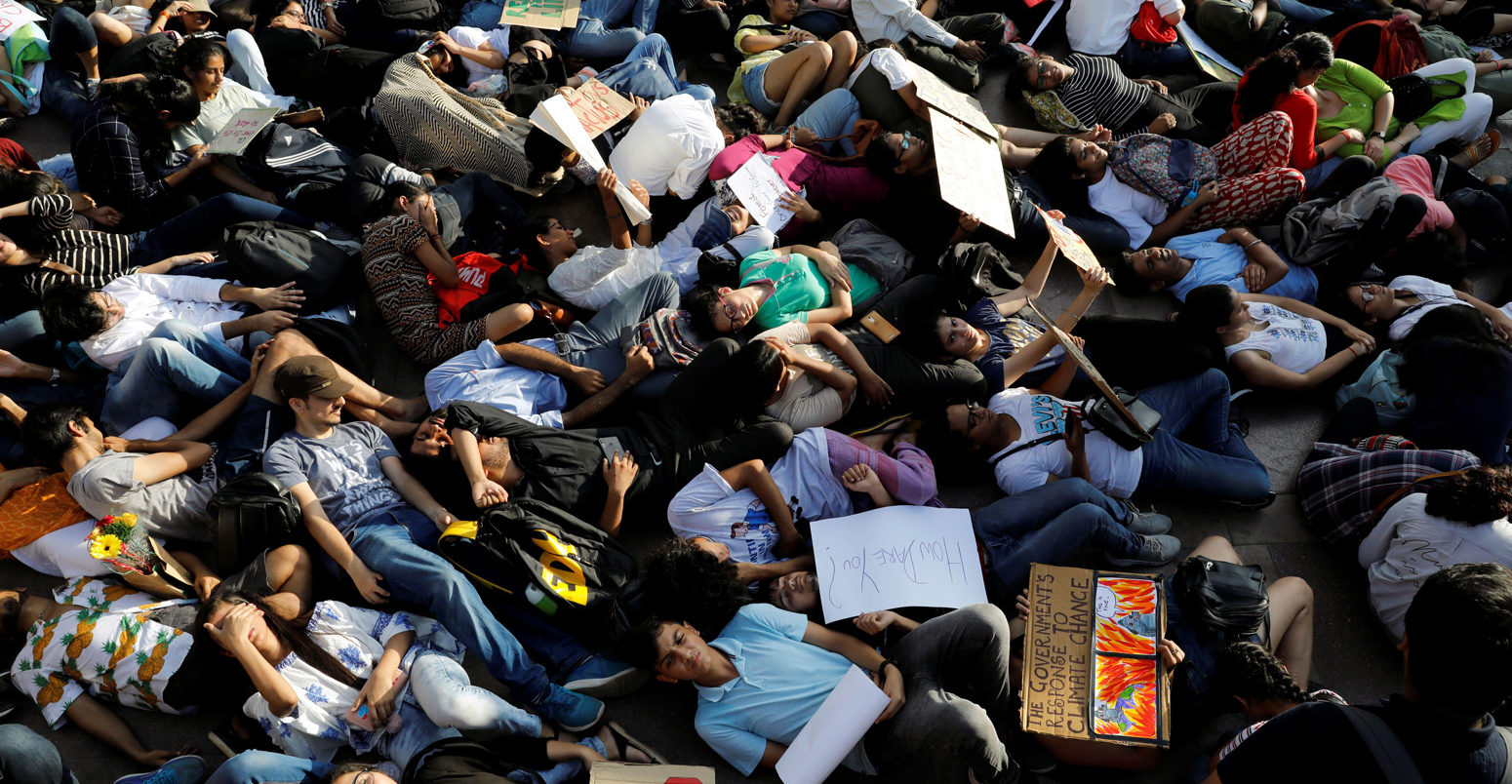
The term “climate justice” captures the various ways in which global warming impacts people differently and the approaches that can be taken to address this problem “fairly”.
- Analysis: In-depth Q&A: What is ‘climate justice’?
- Analysis: Which countries are historically responsible for climate change?
- Analysis: The lack of diversity in climate-science research
- Climate justice: The challenge of achieving a ‘just transition’ in agriculture
- Researchers: The barriers to climate science in the global south
- Guest post: An Indigenous peoples’ approach to climate justice
Climate-justice language has been used to describe everything from retrofitting the UK’s poorly insulated homes to supporting cyclone-struck communities in Mozambique.
As part of a week-long series on climate justice, Carbon Brief has asked a range of scientists, policy experts and campaigners from around the world what the term means to them and why they think it is important.
These are their responses, first as sample quotes, then, below, in full:
- Prof Kyle Whyte: “The climate justice movement…should not just be a movement that seeks to lower carbon footprints so that the world of privileged people is preserved.”
- Dr Adrienne Hollis: “Climate justice matters because we are in an era of racial and social reckoning.”
- Dr Jalonne White-Newsome: “I long for the day when low-income, black, Indigenous and people of colour do not suffer disproportionately from the irresponsible stewardship that we all contribute to.”
- Yeb Saño: “The climate crisis is a manifestation of the pervasive injustice that has brought us economic inequality, oppression, subjugation and exploitation.”
- Dr Kaveh Madani: “The people of the global south deserve the same quality of life as the people in the global north, but this remains unachievable for them unless there is a transfer of knowledge, technology and wealth.”
- Dr Mary Keogh and Gordon Rattray: “[People with disabilities] are…among those most impacted by climate change, whose human rights are most at risk of violation by inappropriate climate action and for whom true climate justice is essential.”
- Prof Henry Shue: “Justice obligates us to assist with development, and climate requires us to do so in ways that avoid increasing emissions.”
- Prof Chris Hilson: “Without attention to [climate justice], government policy on climate change may face backlash from groups in society that can ill afford the changes.”
- Sakshi Aravind: “[Climate justice is] our biggest opportunity to rebuild a world led by Indigenous knowledge forms, worldviews and ways of living.”
- Dr Adelle Thomas: “Climate justice underscores the unfairness of countries and groups that have contributed the least to climate change being most at risk.”
- Dr Saleemul Huq: “The climate change issue can be characterised as pollution by rich people and rich countries adversely impacting poor people…This is morally wrong and every religion teaches that it is wrong.”
- Adrián Martinez: “We call for justice because the current crisis is no longer fuelled by ignorance but by wilful greed.”
- Brandon Wu: “In global terms, [climate justice] means that wealthy countries like the US must lead by example when it comes to climate action.”
- Prof Kimberly Nicholas: “A key element of climate justice is for high emitters to rapidly reduce our own emissions. By doing so, we leave more space for people who need their emissions to survive, and we lessen their burden in facing increasing impacts of climate change they haven’t caused.”
- Osprey Orielle Lake: “Climate justice…requires us to invest in systemic change that centres care for land, women, frontline communities and community-led solutions.”
 Prof Kyle Whyte
Prof Kyle Whyte
George Willis Pack professor of environment and sustainability and member of White House Environmental Justice Advisory Council
University of Michigan
Systems of power, such as racial capitalism and colonialism, have typically inflicted harmful environmental and climatic change. The harms are inflicted by actions, such as land dispossession, forced relocation, deforestation, intensive agriculture, industrial development, and fossil fuel and extractive infrastructure.
The compounded ecological impacts of capitalism and colonialism have rendered many communities and peoples – including Indigenous peoples and people of colour in North America – in situations where they are more vulnerable to climate change.
The climate-justice movement has the opportunity to be a movement that is intersectional, connecting layers of sedimented injustices to current risks and threats. It should not just be a movement that seeks to lower carbon footprints so that the world of privileged people is preserved. Climate justice has to begin with the assumption that there is nothing normal about the environmental conditions of today, which were shaped largely by capitalism and colonialism.
Climate-justice advocacy must involve being extremely appalled by the last several centuries of inaction to lower carbon emissions, which is not a new or unprecedented form of inaction. It is connected to generations of ecological violence that have not yet been reconciled, and are rarely acknowledged.
Climate justice means calling out “false” solutions to mitigating climate change that seek to ease the energy transition for the fossil industry and privileged populations. Many of these false solutions involve mining, new infrastructure and exploitative profit and labour schemes that will generate further environmental and climate injustice.
 Dr Adrienne Hollis
Dr Adrienne Hollis
Principal
Hollis Environmental Consulting Services (former senior climate justice and health scientist at the Union of Concerned Scientists)
I think of climate justice as an important part of a larger issue, environmental justice, which I envision as a huge umbrella with many spokes. Each spoke is an interrelated issue – climate justice, racial justice, immigration justice, criminal justice, gender justice, etc.
These issues matter – climate justice matters – because our environment is not just where we live, pray, play, work and learn, it is also who we are, how we are treated and why. People are not affected by these issues equally, whether through intent or indifference.
Climate justice matters because we are in an era of racial and social reckoning and ensuring that justice and equity are incorporated into our actions. Climate justice focuses on correcting decades of structural racism which affect communities of colour, poor communities, rural communities and non-English speaking communities more than any other. Remember, long before our brothers and sisters of colour screamed that they could not breathe at the hands of the justice system, they (we) were choking on environmental pollution resulting from racist practices.
Climate justice matters because it forces people to work with and protect communities bearing the brunt of devastating hurricanes and accompanying flooding, disproportionate exposures to toxic substances, chronic flooding, premature deaths, chronic illnesses and more. Through it, we can begin to address a multitude of issues such as infrastructure (including housing quality and affordability, transportation, roads), economic apartheid, food apartheid, mental and physical health, climate gentrification and others. You cannot address climate justice without addressing these issues. That is why it matters.
 Dr Jalonne White-Newsome
Dr Jalonne White-Newsome
CEO/founder and professorial lecturer at George Washington University
Empowering A Green Environment and Economy
In 2014, my five and seven-year-old daughters and I marched through the streets of New York with thousands of passionate people during the Peoples Climate March. The hope was that raising the consciousness of decision makers would move us closer to policy that would begin to address the root causes of climate change. Most importantly, the goal was to create systems that would actually protect black and brown folks in environments that were hazardous to their health and the wellbeing of their future generations.
Why climate justice or environmental justice matters is not the question we should be asking. The question that has fuelled my work, my research, my advocacy and my ministry for the last 20-plus years has been simply this: Why do some people matter and other people do not? To answer that question, we must start with understanding what climate justice really is.
Climate justice is an aspiration, a movement and a human right. It is not being afraid that every time it rains your home will flood, and being able to stay cool on extremely hot days. It is being able to afford “real” clean energy to power your households, public transportation, schools and senior living facilities. It is stopping the expansion of extractive industries, re-imagining solutions that benefit everyone and learning to value traditional scientific prediction models and mechanisms.
It is preparing communities for the worst and ensuring easy, barrier-free access to relief and support to aid in the recovery after a climate disaster. It is realising that the toll on mental health is just as damaging as the levelling of a home in a storm, and accounting for that in the costs and solutions necessary to repair people’s lives.
It is acknowledging the destruction we have caused and showing our forgiveness to Mother Earth with our actions. It is sharing an understanding that black and brown people have suffered disproportionately from historic, systemic/institutional racism and environmental injustices that have made certain communities more vulnerable than others by no fault of their own. I long for the day when low-income, black, Indigenous and people of colour do not suffer disproportionately from the irresponsible stewardship that we all contribute to.
I truly believe that each of us – in whatever role we play – has the power to achieve climate and environmental justice by ADAPT-ing:
- Acknowledging the harm
- Demanding accountability
- Addressing racism, power and privilege
- Prioritising equity
- Transforming systems.
And seven years after the climate march, climate justice still matters to me because I want to be able to say to my two young, beautiful brown-skinned daughters that there will be a Mother Earth for you and your children to enjoy.
All people deserve to live free of fear, full of confidence that the infrastructure won’t fail and the places and people that have suffered multiple environmental insults for decades will be equitably resourced and prepared to live in our new climate reality.
 Yeb Saño
Yeb Saño
Executive director
Greenpeace Southeast Asia
Climate justice is an issue that should sit at the core of our societies. Since the dawn of the climate crisis, brought about by the industrialisation of the world, it has been the people least responsible who bear the brunt of its worst impacts.
In the Philippines, it has been the poorest sectors – our farming and fishing communities – who have been struggling the hardest since climate change has altered the patterns that previously have been relied on for generations to take advantage of timings for planting, harvesting, sailing out to sea and other such folk knowledge. They are also the first to experience extreme weather events that are super-fuelled by climate change and they experience it the worst. Ironically, they also contribute the least to carbon emissions and are additionally at a disadvantage to commercial fishers and agro-industrial corporations that make large contributions to carbon emissions.
The climate crisis is a manifestation of the pervasive injustice that has brought us economic inequality, oppression, subjugation and exploitation. Pursuing climate justice therefore allows us to get to the fundamental root and truth of the human condition. The climate crisis profoundly threatens real lives and livelihoods. It is a real, clear and present danger to the realisation of basic human rights.
How then do we pursue climate justice? We stand up against every kind of injustice. We must hold those responsible to account, make them stop the damage they willfully cause, and rally the whole world to end the fossil fuel era.
This is the spirit behind the Philippines’ Climate Justice and Human Rights Petition against the top corporate carbon polluters called the “carbon majors”, which include the world’s biggest oil, gas, coal and cement companies, such as Chevron, ExxonMobil, BP, Royal Dutch Shell, Total, BHP Billiton, Glencore, Suncor and ConocoPhillips, among many others.
The complaint was filed by a range of climate-justice advocates and, as a result of the petition, the Philippines’ Commission on Human Rights launched the National Inquiry on Climate Change (NICC). This probe looked into whether the world’s largest carbon producers are violating or threatening to violate the human rights of all Filipinos by their significant contribution to climate change and failing to reduce emissions, despite having the capacity to do so.
 Kaveh Madani
Kaveh Madani
Visiting fellow
Yale University
Climate justice matters because the scope of the climate change problem is not only limited to nature. This problem has a human dimension and when humans are involved, justice matters.
Obviously, we will not bear the climate change impacts fairly and equally. The marginalised, low income, Indigenous, minority and disadvantaged communities will be disproportionately impacted by global warming. They also have a much more limited capacity to mitigate climate change and cope with its consequences, compared to the wealthier groups. This means that climate change is going to increase the already significant inequalities around the world.
The discussions about climate justice are mostly focused on the disproportionate human “impacts” of climate change. But we must also worry about important inequalities in the levels of contribution to the “causes” of climate change. Justice principles call for taking historical responsibility for causing the problem into account.
The wealthy nations’ resource-exhaustive, un-green economies together with their unsustainable and consumptive lifestyles created this problem. They have the ethical responsibility as well as the required capacity to take immediate climate action and help the poor nations. The people of the global south deserve the same quality of life as the people in the global north, but this remains unachievable for them unless there is a transfer of knowledge, technology and wealth from the advanced economies.
We must also care about the temporal and spatial dimensions of climate justice. Its temporal dimension necessitates paying attention to intergenerational climate justice and underlines the need for protecting the environmental rights of our children by taking climate action. The spatial dimension of climate justice reminds us about the heterogenous climate change impacts across space and geographic coordinates, calling for different levels of mitigation and adaptation efforts around the globe.
We have “unequal” responsibilities and levels of access to the necessary resources to secure an “equal” world under climate change.

 Dr Mary Keogh and Gordon Rattray
Dr Mary Keogh and Gordon Rattray
Disability inclusion director, CBM Global &
International cooperation officer, European Disability Forum
People with disabilities have long been recognised as one of the groups living at the greatest risk of poverty, exposed to discrimination and continually facing attitudinal and accessibility barriers which prevent their participation in decision-making. They are, therefore, among those most impacted by climate change, whose human rights are most at risk of violation by inappropriate climate action and for whom true climate justice is essential. All of this is especially pertinent for people with disabilities living in low-income countries.
Achieving climate justice for all people with disabilities, so that efforts to adapt and mitigate its impact are achieved in a just, inclusive and egalitarian way, requires a transformation of economies and social systems. The necessary steps towards this transformation include ensuring meaningful participation of representative organisations of people with disabilities in climate policy forums and the development of climate adaptation and mitigation plans. This means ensuring that these processes – at all levels from global to national to local – are fully accessible.
What is often forgotten is that people with disabilities are often natural problem solvers, used to finding solutions to overcome the barriers they face on an everyday basis. Taking a disability-inclusive approach means that these skills could bring innovative solutions to climate adaptation plans.
As well as being a human right and a legal obligation, climate justice is an approach that will benefit everyone in society.
 Prof Henry Shue
Prof Henry Shue
Senior research fellow
Centre for International Studies at the University of Oxford
Climate justice means not allowing might (and wealth) to make right, but instead using power to protect the powerless. It has two dimensions: spatial, which is international justice, and temporal, which is intergenerational justice. In both dimensions climate justice is important because it grounds even greater urgency for ambitious mitigation than self-interest alone already does.
International climate justice means urgent ambitious mitigation in the form of investment in non-carbon energy infrastructure in less developed nations. This would allow them to develop even while climate change is slowed, by leap-frogging fossil-fuel infrastructure. Justice obligates us to assist with development and climate requires us to do so in ways that avoid increasing emissions. The wealthy developed nations have the resources to do this and the less developed do not. We control what they can do.
Intergenerational climate justice means urgent, ambitious mitigation in the form of non-carbon energy infrastructure in developed nations so that we do not trap future generations into a corner. If the global energy regime remains as unsustainable as it is, they will face choices between experimentation with untried, expensive and possibly inadequate technologies for carbon extraction and changes in lifestyle that generate social conflict and mass migration. Future generations will have to negotiate the global energy system we leave behind. We control what they must face.
 Prof Chris Hilson
Prof Chris Hilson
Professor and director of the Reading Centre for Climate and Justice
University of Reading
Climate justice matters both for its own sake because it is morally right, but also instrumentally. Without attention to it, government policy on climate change may face backlash from groups in society that can ill afford the changes. There is a risk that the costs of decarbonising, particularly home heating and transport, may fall disproportionately on the poor.
When thinking about climate justice, though, there is often a temptation to consider only this “poor” side of the equation. Important as this is, there is a danger that it draws attention away from the other side of the climate justice equation, which is the rich. Climate justice is also a matter of ensuring that the rich do not take up more than their fair share of the remaining, finite carbon budget. Superyachts, private jets and space travel by the super-rich certainly fit the unfair share category, but so too do the SUVs, frequent flights and excessive consumerism of many of the merely rich.
Climate justice also matters too much to be hijacked by those who use it for their own nefarious purposes. Sadly, we have started to see that in the UK in recent months. Some on the right of the Conservative party have been using climate justice as a convenient cloak to argue against important policy changes needed for the country to deliver on its net-zero promises. Suddenly, a wing of the party that was silent on the injustice of the politics of austerity after the financial crisis is supposedly concerned about how poorer households will afford to move away from gas boilers for home heating. This is a valid concern, but the “just” answer is government subsidy and support for those households – climate justice should not be used as a Trojan horse excuse for climate delayism.
 Sakshi Aravind
Sakshi Aravind
PhD student and lawyer
University of Cambridge
For better or worse, climate justice is a largely undefined phrase. However, a phrase does not lose its significance or relevance because it is not articulated through a specific set of terms. Those of us working on the notions of climate justice or Indigenous environmental justice have used the “undefined” nature of climate justice to articulate it as a phrase that embraces social and economic justice and the emancipatory struggle of black, Indigenous and people of colour.
I work on encounters between law and indigeneity within settler courts. For me, climate justice is our opportunity to rethink and reframe knowledge about what constitutes justice and how it must be a necessary corollary of antiracist, anticapitalist, and anticolonial struggle. It is also our biggest opportunity to rebuild a world led by Indigenous knowledge forms, worldviews and ways of living.
Climate justice starts with the return of Indigenous land and the recognition of Indigenous sovereignty. If we are to avert a planetary crisis, we will have to dismantle settler colonialism and imperialism. What we are missing from a meaningful climate justice discourse is the diversity of voices, especially those who have struggled against extractive, imperialist and colonial forces for their survival.
While we understand environmental justice as a concept, it is doubtful if we have understood how environmental inequalities replicate in climate change, how racial injustices are aggravated in experiencing the full force of climate catastrophes. Climate justice is a point of re-education and relearning for most of the world, especially the global north.
There has been some conversation around Indigenous knowledge as the way out of current climate crises, particularly after the recent Intergovernmental Panel on Climate Change (IPCC) report. Indigenous knowledge is not free of Indigenous politics or sovereignty claims. Indigenous knowledge is not an apparatus one can put in place to save the western nations from an apocalypse and then conveniently discard without ever addressing the primary reasons which led us to this predicament in the first place. Climate justice aims to understand Indigenous knowledge as emerging from Indigenous connection to the land and re-establishing plural Indigenous sovereignties that were never ceded.
 Dr Adelle Thomas
Dr Adelle Thomas
Regional lead Caribbean science
Climate Analytics
Climate change has no borders – emissions contributed by one country or group have global consequences. Climate justice underscores the unfairness of countries and groups that have contributed the least to climate change being most at risk.
For example, small island developing states collectively contribute less than 1% of emissions that drive climate change but are already suffering significant impacts and face existential risks as global temperatures rise.
Climate justice helps us to put into context the significant impacts of climate change that we are already experiencing today. We can better recognise that impacts of climate change are experienced much differently by a middle-income family in a developed country than they are by a poor migrant in the developing world. Recognising these differential impacts must lead to just and equitable climate action that addresses the needs of those that are unfairly put at risk.
 Dr Saleemul Huq
Dr Saleemul Huq
Director
International Centre for Climate Change and Development (ICCCAD)
My view is that the question should be “why does climate injustice matter?” Climate justice is an abstract notion that is not easy to explain or understand, but climate injustice is clear and visible and needs to be rectified.
In this reframing, the climate change issue can be characterised as pollution by rich people and rich countries adversely impacting poor people, in both rich and poor countries. This is morally wrong and every religion teaches that it is wrong.
Therefore, if we accept this premise, then it is incumbent on each and every person on the planet to take requisite actions to tackle climate change. For those of us whose personal carbon footprint is higher than the global average we must try to reduce wherever we can. But that is not enough, so we also need to mobilise with allies to push our respective political leaders to take the actions they have already agreed to do in the Paris Agreement but are not doing in practice.
Finally, we should also reach out to the victims of human-induced climate change in the most vulnerable communities in developing countries to express solidarity and support, and to help them adapt to the adverse impacts of climate change and also deal with the loss and damage that is now a reality.
 Adrián Martinez
Adrián Martinez
Director
La Ruta del Clima
Justice is about acknowledging the rights of others. It is about respect and responsibility towards our community. Justice stands on the idea that we are accountable for our actions because we require peace and prosperity in our society. These values have been broken due to climate change.
Climate justice is a political movement born out of the unjust causes of climate change and the wilful irresponsibility of big carbon emitters. As our climate changes and its adverse effects destroy our communities across the globe, the unresolved questions of who is responsible and why there are no consequences for the harm caused inhibits peace and kills people. We call for justice because the current crisis is no longer fuelled by ignorance but by wilful greed and the immoral desire to provide no reparations for unjust harm.
Climate justice is about our right to have a community, live with dignity and see those who have harmed and profited be held accountable now.
 Brandon Wu
Brandon Wu
Director of policy and campaigns
ActionAid USA
Climate justice is the simple idea that those who have done the most to cause the climate crisis – and who have the most resources – must also do the most to fix it. In global terms, this means that wealthy countries like the US must lead by example when it comes to climate action by undertaking urgent emissions reductions at home and providing hugely ramped-up financial support for action in poorer countries.
The US obligation is enormous due to our historical pollution and national wealth. To even begin to approach our fair share, we must reduce emissions by 70% by 2030 and provide at least $800bn in international climate finance by 2030. To hold climate justice at the centre, these actions must be undertaken with the input and leadership of frontline communities, at home and abroad, to ensure no one is left behind.
A climate-just future is, thankfully, easy to imagine. Because of the nature of politics and power it may be hard to achieve, but given what is at stake, we have no choice but to fight for it.
 Prof Kimberly Nicholas
Prof Kimberly Nicholas
Associate professor
Lund University
We who have driven the most warming must drive the transformation to stop it. At the national level, this puts special responsibility on the US and Europe, where about 12% of the global population have spewed half the world’s fossil pollution. At the company level, it’s the 100 companies behind 71% of industrial greenhouse gas emissions. At the individual level, the super-rich “polluter elite” are clear offenders, but we can’t ignore those of us in the global richest 10%, earning $38,000 and up, who account for about half of household carbon pollution.
A key element of climate justice is for high emitters to rapidly reduce our own emissions. By doing so, we leave more space for people who need their emissions to survive and we lessen their burden in facing increasing impacts of climate change they haven’t caused. Governments need to enact policies that stop allowing or incentivising climate destruction. Industries need a business plan that eliminates most of their climate pollution within the next 100 months and entirely stops adding carbon to the atmosphere soon after.
Finally, high-emitting individuals also need to cut their own fossil energy overconsumption, most of which comes from frequent and long-distance plane and car travel. Meanwhile, the 3.6 billion poorest have room to triple their emissions to meet their needs.
In a new perspective in Nature Energy led by Dr Kristian Steensen Nielsen, my colleagues and I argue for the transformative potential of the global elite – known as the middle class in many industrialised countries – taking five kinds of climate action. We can catalyse meaningful emissions reductions by reducing our own consumption; divesting our savings, pensions and investments from fossil fuels; through our personal and professional networks where we have influence; at work, and in community and civic life through our role in organisations; and as citizens, from voting to to participating in social movements.
 Osprey Orielle Lake
Osprey Orielle Lake
Executive director
Women’s Earth and Climate Action Network (WECAN) International
False solutions, white supremacy, colonisation and patriarchy have no place in any climate action plan. To confront this crisis, we need coherence across policy sectors, from trade to military spending to development, to confront these interconnections globally. It is imperative that governments and financial institutions adopt a just transition, care economies and feminist policies and frameworks.
Climate justice requires us to not only address the climate crisis but to entirely dismantle the structures that brought us to this moment. Climate justice also requires us to invest in systemic change that centres care for land, women, frontline communities and community-led solutions.
From food sovereignty to forest protection, fossil-fuel resistance to feminist climate policies, Indigenous rights to the rights of nature, women and frontline communities have been demonstrating climate-just solutions for decades. We need rights-based solutions grounded in justice and ecological integrity, while simultaneously building a new economy predicated on gender and racial justice, Indigenous rights, rights of nature and rights of future generations.
There is a path forward for mitigating the worst impacts of the climate crisis and securing our collective future – however we must act rapidly. Women’s Earth and Climate Action Network (WECAN) International has organised a call to action for governments and financial institutions in the lead-up to COP26 demanding immediate climate action, signed by over 120 organizations representing millions of people. We can act now and we must act now!

